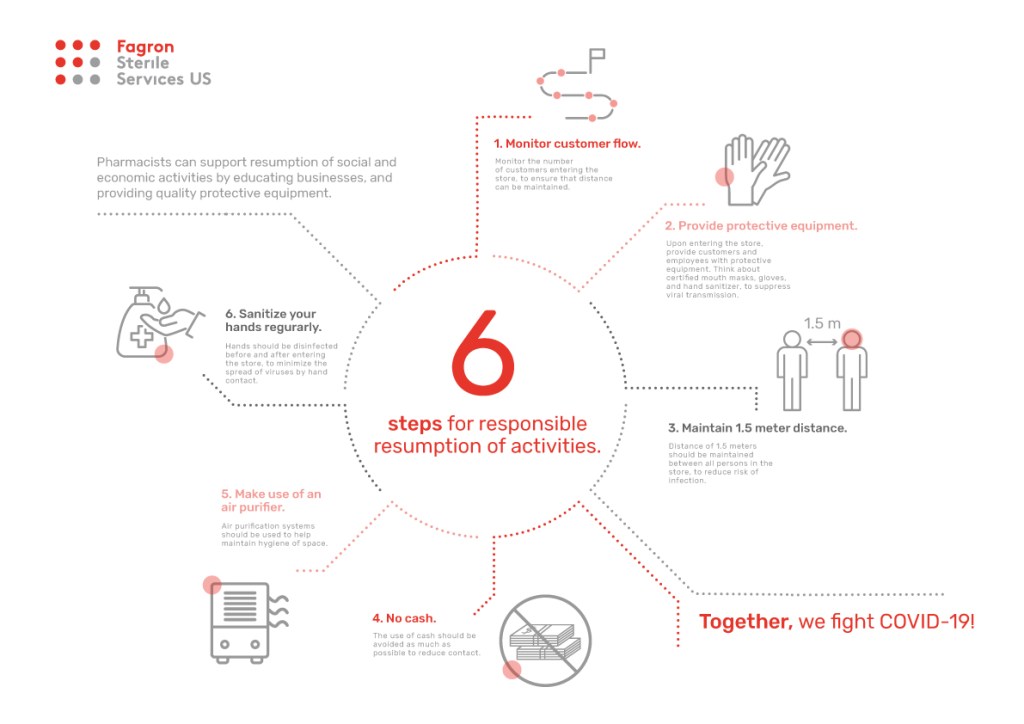Six Steps for Responsible Resumption of Activities

Divided by Uncertainty
As state's public health policies related to coronavirus and reopening non-essential businesses evolve, concerns are being raised regarding a second wave of outbreak.
President Trump unveiled new federal guidelines with conditions for loosening the social distancing and isolation procedures put in place to fight the spread of the pandemic. However, dissension is widespread among government officials, health experts and the public over timing.
Health officials warn COVID-19 is far from over. On one extreme, an unfinished government report suggested coronavirus cases could increase to 200,000 per day by June, accompanied by 3,000 deaths. This would amount to a substantially higher number than Trump’s previous estimate of a 100,000 person total death count. Both Trump and the Centers for Disease Control immediately rejected those figures.
Political and economic pressures continue to mount as Anti-Lockdown Protests emerge. Armed citizens held a demonstration at the Michigan State Capital expressing constitutional overreach. Many small business owners throughout the county are trying to organize and salvage what is left of their financially decimated businesses.
Discovering Balance
While trying to achieve a balance between public health and socioeconomic activity, some measures need to be extended to maintain the effective reproduction number of COVID-19 and prevent viral reintroduction.
The CDC announced the creation of the SARS-CoV-2 Sequencing for Public Health Emergency Response, Epidemiology and Surveillance (SHPERES) consortium to expand the use of genome sequencing.
SHPERES findings may speed the release of better data to help avoid new infections and establish best practices to combat the virus. However, it will take time until that data can be produced and disseminated.
Formidable Pharmacist Influence
Pharmacists can support the reopening of social and economic activities by educating businesses on responsible hygiene practices and providing quality protective equipment to employees and customers.
Pharmacists are some of the most accessible of heath care providers, particularly in underserved areas. Statistically, a large majority of Americans live within a 5-mile radius of a community pharmacy and tend to see their pharmacist more frequently than any other health practitioner.
A Gallup poll revealed that 70% of participants found pharmacists to have “very high” professional ethical standards, second only to nurses. Accomplishing this level of confidence from American citizens provides a strong influence to preserve current safety measures.
Moving Forward
The graphic below illustrates six steps for the responsible resumption of activities. Pharmacists can work with communities and healthcare facilities to assist in the explanation and implementation of these steps.

1. Monitor flow
Distance of 6 feet should be maintained between all persons to reduce the risk of infection.
2. Provide protective equipment
Upon entering the facilities, provide individuals with protective equipment. Think about certified mouth masks, gloves, and hand sanitizer to suppress viral transmission.
3. Maintain six feet of distance
Distance of 6 feet should be maintained between all persons to reduce the risk of infection.
4. No cash
The use of cash should be avoided as much as possible to reduce contact.
5. Make use of an air purifier
Air purification systems should be used to help maintain hygiene of space.
6. Sanitize your hands regularly
Hands should be disinfected before and after entering a facility to minimize the spread of viruses by hand contact.
Fagron Sterile Services US (FSS) is an expert in 503B Pharmaceutical Outsourcing with experience across three decades. FSS operates two FDA and DEA registered facilities delivering high-quality sterile anesthesia, ophthalmic, dialysis, pain management and specialty pharmacy products to support hospitals, surgery centers and clinics through drug shortages and beyond.
Set up a free consultation today and learn more about a 503B solution you can rely on.
Together, we fight COVID-19!
